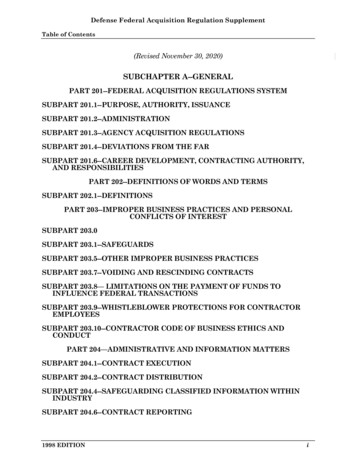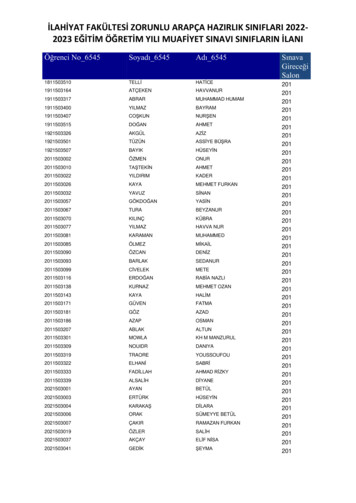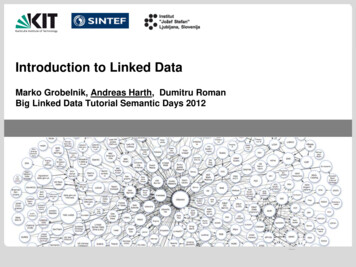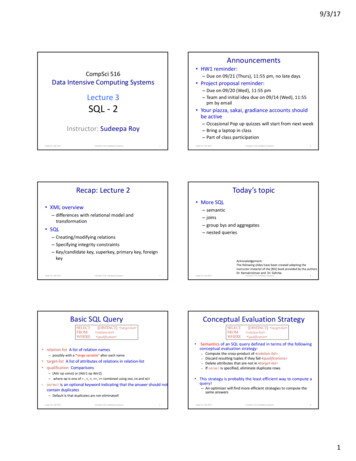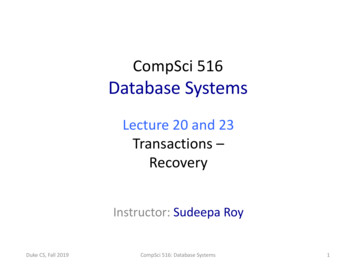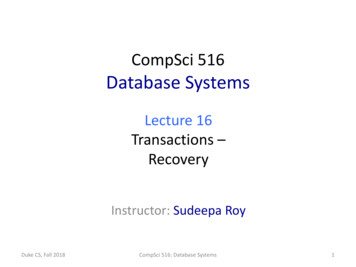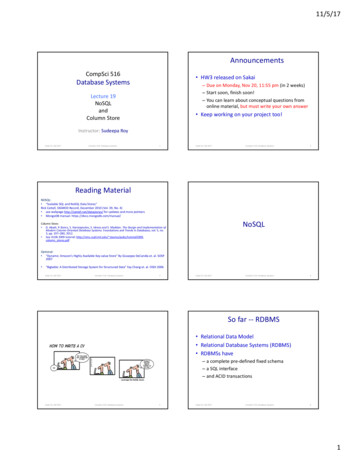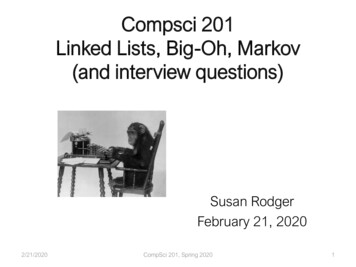
Transcription
Compsci 201Linked Lists, Big-Oh, Markov(and interview questions)Susan RodgerFebruary 21, 20202/21/2020CompSci 201, Spring 20201
Yes it did snow!2/21/2020CompSci 201, Spring 20202
L is for Loops Iteration is a wonderful thing Library Where we find APIs rather than books Linked Lists From Node to Node2/21/2020CompSci 201, Spring 20203
Announcements Exam 1 – Do not discuss until with anyone untilhanded back APT Quiz 1 must complete by Monday Do by yourself Assignment P3 out today – due 2/27 Builds on P2 Markov Discussion 2/24 P3 and Linked Lists APTS2/21/2020CompSci 201, Spring 20204
PFtTFiF Interview Questions Big-Oh, APT practice, APT Practice Linked List Review Visualize, Metaphors, Code Efficient WordGram Maps and text generation2/21/2020CompSci 201, Spring 20205
First Quick Review of Linked Lists2/21/2020CompSci 201, Spring 20206
Visualizing/Understanding Nodes https://coursework.cs.duke.edu/rodger/diyad-new diyad.linkedlist.SimpleLinkedList Like pair, note: this not needed below Instance variables for String and "next node"2/21/2020CompSci 201, Spring 20207
Iterators to the Rescue Iterators are soooo nice. But timing? Why O(N) linked list and O(N2) array?2/21/2020CompSci 201, Spring 20208
From Iterator to Iterable Enhanced for: for(Strings : list) { Underneath, uses iterator Code below O(N) for both lists!2/21/2020CompSci 201, Spring 20209
From Iterator to Iterable What if indexing loop used?, e.g., list.get(k) Code below is ?2/21/2020CompSci 201, Spring 202010
Compare the two ListSplicer.java (linked list first, then arrayList)iterateEachiterateLinked list too slow with .get2/21/2020CompSci 201, Spring 202011
WOTO (Correctness counts)If you submitted this WOTO last time yourentry was ompSci 201, Spring 202012
Interview Interlude (à la 201) https://leetcode.com/problems/two-sum/ Given an array of integers, return indices (j,k) oftwo numbers that add to a target value. There willbe one solution, can’t use same element twice. Example: findTwo([2,7,11,15], 9) Returns [0,1] Think, pair, share first idea, quantify O-notation2/21/2020CompSci 201, Spring 202013
Big-Oh Analysis Do we have to look at every number? Yes, otherwise we might miss the one! For X, do we know Y such that X Y target? Can we find Y? Where is it? Given X, if we look at all values to find Y then How do we search for a value2/21/2020CompSci 201, Spring 202014
Big-Oh Analysis Do we have to look at every number? Yes, otherwise we might miss the one! For X, do we know Y such that X Y target? Can we find Y? Where is it? Given X, if we look at all values to find Y then How do we search for a value2/21/2020CompSci 201, Spring 202015
Goal of an Interview/Interviewer Can you think of any solution? Can you think outloud? Quantify? Ask for help? Syntax matter?Running time?2/21/2020CompSci 201, Spring 202016
Goal of an Interview/Interviewer Can you think of any solution? Can you think outloud? Quantify? Ask for help? Syntax matter?Running time?2/21/2020CompSci 201, Spring 202017
Goal of an Interview/Interviewer Can you think of any solution? Can you think outloud? Quantify? Ask for help? Syntax matter?Running time?2/21/2020O(n 2)CompSci 201, Spring 202018
Just Say No. When you can2O(n )2/21/2020CompSci 201, Spring 202019
Running times in secondsmachine: 109 instructions/secNO(log N)O(N)O(N log N)O(N2)10 3E-91E-83.3E-80.0000001100 7E-91E-76.64E-70.00011,000 1E-81E-60.000010.00110,000 1.3E-80.000010.00013290.102100,000 1.7E-80.00010.00166110.0081,000,000 0.000000020.0010.019916.7 min1,000,000,000 0.000000031.00265.831.8 years2/21/2020CompSci 201, Spring 202020
Does efficiency matter? Why do we need a copy for binarySearch? You don’t need to know Java like this28-29?O(n)onceeachTotal:O(n log n)26?O(log n)24?O(n log n)2/21/2020CompSci 201, Spring 202021
Does efficiency matter? Why do we need a copy for binarySearch? You don’t need to know Java like this28-29?O(n)onceeachTotal:O(n log n)26?O(log n)24?O(n log n)2/21/2020CompSci 201, Spring 202022
Does efficiency matter? Why do we need a copy for binarySearch? You don’t need to know Java like this28-29?O(n)onceeachTotal:O(n log n)26?O(log n)24?O(n log n)2/21/2020CompSci 201, Spring 202023
Does efficiency matter? Why do we need a copy for binarySearch? You don’t need to know Java like this28-29?O(n)onceeachTotal:O(n log n)26?O(log n)24?O(n log n)2/21/2020CompSci 201, Spring 202024
Does efficiency matter? Why do we need a copy for binarySearch? You don’t need to know Java like this28-29?O(n)onceeachTotal:O(n log n)26?O(log n)24?O(n log n)2/21/2020CompSci 201, Spring 202025
Does efficiency matter? Why do we need a copy for binarySearch? You don’t need to know Java like this28-29?O(n)onceeachTotal:O(n log n)26?O(log n)24?O(n log n)2/21/2020CompSci 201, Spring 202026
Does efficiency matter? Why do we need a copy for binarySearch? You don’t need to know Java like this28-29?O(n)onceeachTotal:O(n log n)26?O(log n)24?O(n log n)2/21/2020CompSci 201, Spring 202027
Does efficiency matter? Why do we need a copy for binarySearch? You don’t need to know Java like this28-29?O(n)onceeachTotal:O(n log n)26?O(log n)24?O(n log n)2/21/2020CompSci 201, Spring 202028
Does efficiency matter? Why do we need a copy for binarySearch? You don’t need to know Java like this28-29?O(n)onceeachTotal:O(n log n)26?O(log n)24?O(n log n)2/21/2020CompSci 201, Spring 202029
Does efficiency matter? Why do we need a copy for binarySearch? You don’t need to know Java like this28-29?O(n)onceeachTotal:O(n log n)26?O(log n)24?O(n log n)2/21/2020CompSci 201, Spring 202030
Method B – just larger2/21/2020CompSci 201, Spring 202031
Can we do better? Can we search faster?50-55:59:60:61: Total?2/21/2020CompSci 201, Spring 202032
Can we do better? Can we search faster than O(log N)?50-55:59:60:61: Total?2/21/2020CompSci 201, Spring 202033
Can we do better? Can we search faster than O(log N)?50-55:59:60:61: Total?2/21/2020CompSci 201, Spring 202034
Can we do better? Can we search faster than O(log N)50-55: O(N)59: O(1)60: O(N)61: O(N) Total?2/21/2020CompSci 201, Spring 202035
Can we do better? Can we search faster than O(log N)50-55: O(N)59: O(1)60: O(N)61: O(N) Total?2/21/2020CompSci 201, Spring 202036
Can we do better? Can we search faster than O(log N)50-55: O(N)59: O(1)60: O(N)61: O(N) Total?2/21/2020CompSci 201, Spring 202037
Can we do better? Can we search faster than O(log N)50-55: O(N)59: O(1)60: O(N)61: O(N) Total?2/21/2020CompSci 201, Spring 202038
Can we do better? Can we search faster than O(log N)50-55: O(N)59: O(1)60: O(N)61: O(N) Total?O(N)2/21/2020CompSci 201, Spring 202039
Can we do better? Can we search faster than O(log N)50-55: O(N)59: O(1)60: O(N)61: O(N) Total?O(N)2/21/2020CompSci 201, Spring 202040
Can we do better? Can we search faster than O(log N)50-55: O(N)59: O(1)60: O(N)61: O(N) Total?O(N)2/21/2020CompSci 201, Spring 202041
Can we do better? Can we search faster than O(log N)50-55: O(N)59: O(1)60: O(N)61: O(N) Total?O(N)2/21/2020CompSci 201, Spring 202042
Can we do better? Can we search faster than O(log N)50-55: O(N)59: O(1)60: O(N)61: O(N) Total?O(N)2/21/2020CompSci 201, Spring 202043
MethodD larger2/21/2020CompSci 201, Spring 202044
Method C – not discussed2/21/2020CompSci 201, Spring 202045
Running times of 4 methods on list ofsize 300000Each found the two values shown in the array in time listed2/21/2020CompSci 201, Spring 202046
ci 201, Spring 202047
Krysta Svore Manages Microsoft QuantumArchitectures and ComputationGroup (QuArC) Princeton Math major, Compsci/Frenchminor“We think a quantum computer couldpossibly solve these [hard] types ofproblems in a time frame that’s morereasonable than the life of the universe,maybe a couple of years, or a couple ofdays, or a couple of seconds,” Svore said.“Exponentially faster.”2/21/2020CompSci 201, Spring 202048
Markov 2: Efficiency Idea related to machine learning Given a training text, use it to create a model Using the model, generate random text Infinite Monkey Theorem? Don't type at random Use letter frequencies!!2/21/2020CompSci 201, Spring 202049
Naïve, Brute Force Idea Given training text "the theatre through that helps" Generate random text based on frequencies For a model-2 Markov process: start with "th" Characters after "th": {"e","e","r","a"} Choose one at random, say "e": generate! Now use with "he", since "th" "e" "he" Following "he": {" ", "a", "l"} Why naïve? Re-scan text every time for follows2/21/2020CompSci 201, Spring 202050
Naïve, Brute Force Idea Given training text "the theatre through that helps" Generate random text based on frequencies For a model-2 Markov process: start with "th" Characters after "th": {"e","e","r","a"} Choose one at random, say "e": generate! Now use with "he", since "th" "e" "he" Following "he": {" ", "a", "l"} Why naïve? Re-scan text every time for follows2/21/2020CompSci 201, Spring 202051
Naïve, Brute Force Idea Given training text "the theatre through that helps" Generate random text based on frequencies For a model-2 Markov process: start with "th" Characters after "th": {"e","e","r","a"} Choose one at random, say "e": generate! Now use with "he", since "th" "e" "he" Following "he": {" ", "a", "l"} Why naïve? Re-scan text every time for follows2/21/2020CompSci 201, Spring 202052
Naïve, Brute Force Idea Given training text "the theatre through that helps" Generate random text based on frequencies For a model-2 Markov process: start with "th" Characters after "th": {"e","e","r","a"} Choose one at random, say "e": generate! Now use with "he", since "th" "e" "he" Following "he": {" ", "a", "l"} Why naïve? Re-scan text every time for follows2/21/2020CompSci 201, Spring 202053
Finding Follow Characters Scan entire text looking for key ovpart2-sp20 Loop O(T) for myText with T characters Again?2/21/2020CompSci 201, Spring 202054
Conceptual and Analytical O(T) To find every follow character for "th" or N-gram Scan text looking for "th", when found ? Repeat, but start scanning from after "th" found In code, scanning means call .indexOf . But with a parameter of where to start search Does this look at all T characters? More than once?2/21/2020CompSci 201, Spring 202055
Don't Scan N times, Scan Once We generate N random characters Get follows N times, each O(T), total is O(NT) Suppose we find all N-grams, e.g., 2-grams "th" - {"e", "e", "r", "a"} "he" - {" ", "a", "l"} Map of 2-gram to ArrayList of following chars Create in O(T) time. Get follows is O(1) So total is O(N T)2/21/2020CompSci 201, Spring 202056
Inheritance In BaseMarkov two methods generateRandomText calls getFollows EfficientMarkov extends BaseMarkov Inherits all of BaseMarkov methods Re-implements or overrides getFollows Inherited generatedRandomText calls new getFollows, overridden method!!2/21/2020CompSci 201, Spring 202057
Efficient Markov Started it for you 2/21/2020CompSci 201, Spring 202058
Markov Big Picture Use BaseMarkov as a start, create EfficientMarkov Make constructors work, create map @Override getFollows to be O(1) not O(T) Benchmark these programs Use WordGram rather than String Generate word-based random text, not char String is collection of characters, WordGram iscollection of Strings Use same idea for map, but use WordGram2/21/2020CompSci 201, Spring 202059
ci 201, Spring 202060
(and interview questions) 2/21/2020 CompSci 201, Spring 2020 1 Susan Rodger February 21, 2020 . Interview Questions Big-Oh, APT practice, APT Practice Linked List Review . ListSplicer.java (linked list first, then arrayList) iterateEach iterate 2/21/2020 CompSci 201, Spring 2020 11 .
